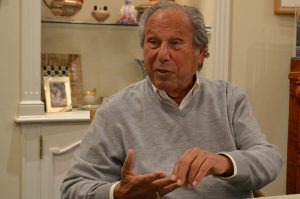EDITORIAL: In dress code controversy, who should decide?
TEST: The Fairness Committee ruled that if more than 10 boys are caught out of dress code before the end of the school year, jeans and long sleeves will not be allowed next school year
May 27, 2021
Considering the numerous student opinions voiced on Schoology and intense debates between students and Rabbi Schwarzberg in the halls this month, it is clear that the student body is in need of a place to voice its opinion on the potential change to dress code that may occur after Rabbi Schwarzberg took the boys to Fairness for abusing certain leniencies.
Town Hall, run by the Agenda Committee and including the whole school, should be that place.
“If you’ve developed the rules and regulations and the consequences together, you’re more apt to listen to them, and that’s what the Just Community’s about,” Dr. Jerry Friedman said in an interview with the Boiling Point last year. When founding Shalhevet, Dr. Friedman put immense focus on students governing themselves through communal discussion, questioning, and voting. Yet during a time of new rules and debates among Shalhevet students and teachers, the Agenda committee is not part of the process. Only Fairness is.
Since returning after Covid, the boys, everyone seems to agree, have abused their freedom to wear dark blue jeans and non-collared shirts with tzitzit out by wearing faded jeans, ripped jeans, light-wash jeans, etc., and non-collared shirts without tzitzit showing.
Instead of there being a Town Hall discussion and petition around the topic of a potential need for change, the Fairness Committee met about it, privately, and decided on setting a probation period from May 24 until June 10.
If during this period more than 10 boys are cited as out of dress-code for specifically wearing light wash jeans or non-collared shirt without tzitzit, boys will no longer be allowed to wear jeans and long sleeve shirts. That would overturn a policy passed by the Just Community in 2014. Male students will have to wear dress pants and collared shirts from then on.
Shalhevet focuses intensely on student voices and initiative, yet when it comes to a case that may lead to a major change for the boys and is not grounded in a religious practice such as tznius (modesty), students are not being given the chance to vote, discuss fully in a school forum, or even argue the current issue with more than a pair of voices heard.
It’s true there was a Fairness hearing during a lunch period, but there were only a few minutes available for students to speak, and even though Rabbi Schwarzberg’s proposal as adopted by the Fairness Committee was slightly altered, there was never a proper school-wide discussion.
This leads thoughtful students like Jacob Hoenig, Jack Sanders and many others to share their opinions through the only other school-wide device they have: Schoology, which has no power at all.
Considering everything mentioned above, one thing is clear, the democracy of the Shalhevet students is on the line.
What will come next? Will Town Halls no longer be a place used for students to decide on future policies? Will a teacher taking the student body to Fairness lead to an immediate probation period devised behind closed doors, instead of having the students decide what to do going forward?
“When I was head of school,” Dr. Friedman said in that same interview, “we never had a vote that I couldn’t live with, because the school was like the curriculum. The curriculum was a school. So when you had a Town Hall meeting, there was that mutual respect, because we developed that atmosphere and everybody — teachers, principals — that we could raise the hand and it was really working.”
We hope Shalhevet moves toward a more direct democracy, rather than the representative democracy it is currently governed by through the Fairness decisions. That’s our agenda for the Just Community.














